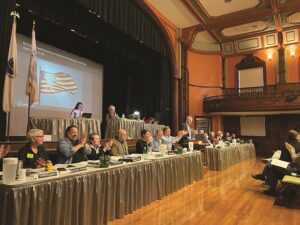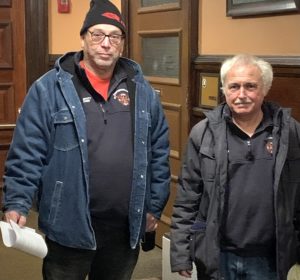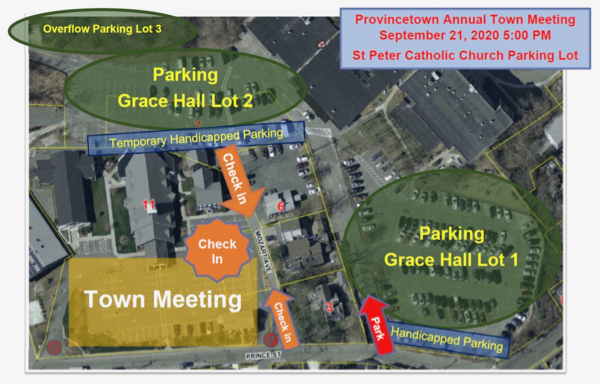TRURO — Town meeting is less than a week away, and there are 42 articles on this year’s warrant. With four budget overrides, 10 Community Preservation Act articles, six citizen petitions, and at least one withdrawn article from the planning board, there is plenty to keep voters on their toes on Tuesday night, April 25 at Truro Central School.
Articles 11 through 14 are Proposition 2½ overrides totaling just over $1.5 million in new spending. They affect the town’s fire and police departments, child-care programs, and housing efforts.
Article 11 would add $601,122 to the fire & rescue dept. budget to bring on more full-time emergency medical staff. Currently, Truro and Provincetown contract for supplemental ambulance support from the nonprofit Lower Cape Ambulance Association, an arrangement that was at one point supposed to end in July. The LCAA contract has now been extended for three years, but the override to fund the transition to a fully-staffed EMS department still received unanimous support from the select board and finance committee.
“This isn’t a system where you just stop one day and start the next,” said Truro Fire Chief Tim Collins at a pre-town meeting forum on April 13. “You need a transition.”
Provincetown’s voters passed a similar $1,058,000 override earlier this month to hire more EMS employees and extend the town’s LCAA contract. Truro’s override would fund four more full-time firefighter-paramedics and a full-time fire and EMS administrator.
Article 12 would appropriate $703,050 to fund three community sustainability efforts: a child-care voucher program for kids up to four years old, a preschool program at Truro Central School, and a program that would provide child care outside of school hours and during vacations.
The article is based on two petitioned articles from Raphael Richter that appear on the warrant as Articles 38 and 39. The select board chose to “adopt” those articles, provide them with a specific funding source, and place them on the warrant separately, a move that the finance committee supported.
Richter’s initial articles are still on the warrant. According to Town Moderator Monica Kraft, they are “still there because it was too late to withdraw.”
Conceivably, town meeting attendees could vote against the override and later in favor of Richter’s very similar article without a funding source — but Kraft told the Independent “that’s very, very unlikely.”
The third override, in Article 13, would appropriate $120,150 to the Planning Dept. budget for the establishment of a full-time housing coordinator. This proposal was an element of Richter’s Article 39, which asks for $82,500 for the position.
“What this position does,” said Kevin Grunwald, the housing authority chair, “is give us somebody within town administration whose primary responsibility is to provide oversight and to really take our housing initiatives and goals to the next level.”
Ten of the 15 towns on Cape Cod have a similar position, Grunwald said. Wellfleet’s town meeting will consider adding a housing coordinator this year, which the select board and finance committee have both voted to support.
Article 14, the final override, would allocate $107,017 to the police dept. budget for the hiring of a full-time “school resource officer” (SRO), requested earlier this year by Police Chief Jamie Calise. “It’s really a position that’s shown a lot of benefit over time,” Calise said at the April 13 forum, citing school safety.
A report by the Mass. nonprofit Citizens for Juvenile Justice offers the opposing view, however, with evidence that police in schools disproportionately harm students of color.
School resource officers “can convey to some people the idea that they’re making places safer,” Citizens for Juvenile Justice Executive Director Leon Smith told the Independent, “but when you look at research there’s really nothing to support that. The school is better off investing money in restorative justice practices and de-escalation.”
Calise also said that an SRO would come with “some ancillary benefits. With an extra staff member during the summer months, there would be a utilization for road work.” The select board narrowly supported Article 14, while the finance committee voted against it.
Articles 16 through 25 propose 10 Community Preservation Act grants, all of which received unanimous support from the finance committee and the community preservation committee. An appropriation of $100,000 for the affordable housing project at 3 Jerome Smith Road in Provincetown also received unanimous support from the select board.
The select board opposed Articles 23 and 24, however, both of which were requested by Truro Center for the Arts at Castle Hill and which ask for just under $50,000 for two historic structures.
Deeper into the warrant, it appears that the planning board will be withdrawing Article 35, which would amend the town’s zoning bylaw to allow duplex structures by right in certain circumstances.
At a public hearing on March 29, confusion about the duplex article led to a discussion about amending it on town meeting floor or withdrawing it for revisions.
The planning board considered voting in favor of its article and amending it later, but Town Planner Barbara Carboni said, “You can’t really have a player to be named later in your vote.”
“Members of the public brought up a few very good points,” planning board chair Anne Greenbaum told the Independent, “and we will have it ready for special town meeting in the fall.”
In addition to Richter’s two petitioned articles, there are four others, including a zoning bylaw meant to limit the size of houses.
Article 37, submitted by Darrell Shedd, would eliminate a special permit provision that allows houses to exceed the total gross floor area limit by 1,000 square feet. Planning board members had initially praised the article, but at the March 29 public hearing it became clear that it could backfire by making it possible to request special permits for even larger areas.
After a discussion with Shedd, the board decided to revise the measure for fall town meeting — and vote against it for now.
For weeks, it has appeared that Article 40 might be the most hotly contested measure at town meeting. The petitioned article would require dogs be leashed or otherwise restrained at all times, and it would authorize a person being approached by an unrestrained dog to “use any means necessary to stop the dog.”
The select board voted unanimously against Article 40. Kraft said that, according to the town counsel, the article is improperly drafted.
“It’s not in proper form for a bylaw, and at town meeting town counsel will explain that to the body,” Kraft said.
Article 41 is a nonbinding resolution regarding a potential closure of Mill Pond Road, but it is no longer relevant following the select board’s March 28 decision to install a culvert rather than breach the roadway.
Finally, Article 42 is a petitioned article that would amend the town charter so that the library trustees must be consulted in the hiring of a new library director, which is currently at the town manager’s discretion.
In a comment published in the warrant, Town Manager Darrin Tangeman wrote that the article “could lead to unfounded assertions of authority and a mistaken outsized role for the Library Trustees in the appointment process in the future.”
The charter review committee did not issue a recommendation regarding the article, and the select board had four abstentions and one vote against it.
Truro’s town meeting will begin at 5 p.m. on Tuesday, April 25 at Truro Central School. Transportation, child care, and assistive listening devices are available, although voters are requested to call town hall by Thursday, April 20 to secure those services.






